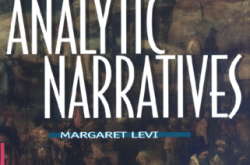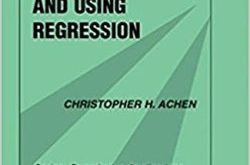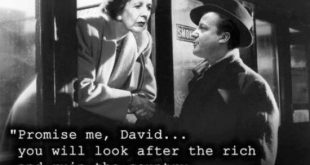‘Rational choice’ history — a case of models not fitting the facts Rational choice history is in a worse situation than that of either mechanistic biology in the seventeenth century or of sociobiology today. The analogy would be appropriate if it were mainly a question of refining the theories and of gathering more evidence. One could refine theory by incorporating bounded rationality and quasi-rational choice, so as to match more closely the way in which...
Read More »Parce mihi domine
[embedded content] Advertisements
Read More »National security adviser John Bolton — a bullying madman
National security adviser John Bolton — a bullying madman John R. Bolton, chosen by President Trump to be his new national security adviser, does not need the Senate’s endorsement to succeed H. R. McMaster in the job. But in 2005, the extraordinary refusal to confirm his nomination to be President George W. Bush’s ambassador to the United Nations by a Republican-controlled committee is worth revisiting for what it revealed about Mr. Bolton and what it may...
Read More »How to interpret and use regression analysis
How to interpret and use regression analysis After having mastered all the technicalities of regression analysis and econometrics, students often feel as though they are the masters of the universe. I usually cool them down with a required reading of Christopher Achen’s modern classic — Interpreting and Using Regression. It usually gets them back on track again, and they understand that “no increase in methodological sophistication … alter the fundamental...
Read More »Do economic models — really — explain anything at all?
Do economic models — really — explain anything at all? In my view, scientific theories are not to be considered ‘true’ or ‘false.’ In constructing such a theory, we are not trying to get at the truth, or even to approximate to it: rather, we are trying to organize our thoughts and observations in a useful manner. Robert Aumann What ‘Nobel prize-winning’ economist Robert Aumann and other mainstream economics defenders of scientific storytelling ‘forget’ is...
Read More »Transitivity — a questionable ‘rational choice’ assumption
Transitivity — a questionable ‘rational choice’ assumption My doctor once recommended I take niacin for the sake of my heart. Yours probably has too, unless you’re a teenager or a marathon runner or a member of some other metabolically privileged caste. Here’s the argument: Consumption of niacin is correlated with higher levels of HDL, or “good cholesterol,” and high HDL is correlated with lower risk of “cardiovascular events.” If you’re not a native...
Read More »Stoppa järnvägsnedläggningarna!
Yours truly debatterar i dagens Göteborgs-Posten den sanslösa järnvägsnedläggnig som staten i det tysta är i full gång med: Infrastrukturen tycks löpa amok med klimat, demokrati och skattemiljarder. Trafikverket fortsätter att vansköta den svenska järnvägen och bluffar nu även igenom nedläggning av elbanor i Västra Götaland. Landets järnvägar är också mest 1800-talskrokiga enkelspår, en otänkbar standard för moderna vägar. Samtidigt storsatsar regeringen och trafikverket på...
Read More »Game theory — a severe case of ‘as if’ Model Platonism
Game theory — a severe case of ‘as if’ Model Platonism The critic may respond that the game theorist’s victory in the debate is at best Pyrrhic, since it is bought at the cost of reducing the propositions of game theory to the status of ‘mere’ tautologies. But such an accusation disturbs the game theorist not in the least. There is nothing a game theorist would like better than for his propositions to be entitled to the status of tautologies, just like...
Read More »Thatcher in retrospect
Yours truly was interviewed last week for a radio program re the legacy and impact of Margaret Thatcher on society. The picture below conveys, in not so many words, my feelings and views on the subject … The rising inequality that has been going on in our societies since the Reagan-Thatcher era is outrageous. Income and wealth have increasingly been concentrated in the hands of a very small and privileged elite. And a society where we allow the inequality of incomes and...
Read More »The poverty of deductivism
The poverty of deductivism The idea that inductive support is a three-place relation among hypothesis H, evidence e, and background factors Ki rather than a two-place relation between H and e has some drastic philosophical implications, which partly explains why philosophers of science have been so reluctant to endorse it. The inductivist program … aimed at doing for inductive inferences what logicians had done for deductive ones … Once the Ki enter the...
Read More » Lars P. Syll
Lars P. Syll









